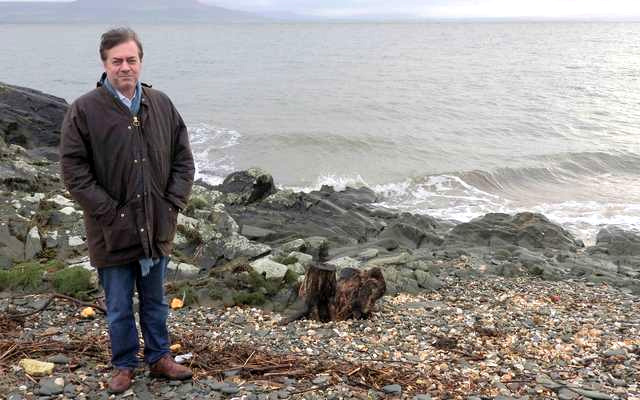Article is by Paddy Clancy @IrishCentral irishcentral.com claims to be the largest Irish site in North America.
Top Broadway producer John Gore seeks to stop sewage dumped into Lough Foyle. Image: Paddy Clancy.
A top Broadway producer has joined a 30-year campaign to stop sewage pouring into the Irish waters over which the dragons fly in the TV series “Game of Thrones.”
John Gore, the owner of multi-billion dollar Broadway.com, the largest live entertainment company on the planet, is fuming at plans by Irish Water to construct a sewage treatment plant near his shore-side Irish holiday home and pipe the contents out into Lough Foyle.
Local residents in the Community for a Clean Estuary have been campaigning to get the scheme transferred a few kilometers north so the effluent can be piped into the Atlantic and away from Lough Foyle which is bordered by Northern Ireland and the Republic.
Irish Water says it will apply this year for permission to start the scheme on the Republic’s side at Carnagarve, outside Moville, Co. Donegal.
Carnagarve is an area of outstanding beauty, with about a dozen small beaches with pristine bathing conditions along four kilometers linked by a shoreside walk that runs between Moville and Greencastle.
Glenburnie beach adjacant to proposed sewerage discharge pipe location.
Gore, who has been visiting the area for 15 years, recently bought a period house on land running to the water’s edge which he has been renovating as a holiday home.
He loves the beauty of the area, not far from Malin Head where part of Star Wars was filmed.
Across the Lough in Northern Ireland, he can see the site from which dragons flew in Game of Thrones.
Campaigners in the Republic insist that Irish Water should retain a scheme first approved by the local council in 1990 to construct the sewage plant on land near Greencastle with a discharge pipe running out to the Atlantic. The plan was, somehow, later changed. Officials opted instead to have a pipe discharging the sewage directly into Lough Foyle less than 300 meters from the shore.
Gore, whose Broadway stage productions won several Tony awards, says he is prepared to put millions of dollars of his own money into any litigation involved in saving the Lough from pollution.
He said: “If the Irish Water scheme goes ahead can you imagine what the smell would be like? Can you imagine what it would do to all those beaches? It would never be allowed anywhere else.
“Somehow, in 1990, the elected members of Donegal County Council voted unanimously for the scheme not to be in the Lough, but for it to be out at sea. We don’t see where the legal precedent is that enables that ruling to be changed, apart from the fact they kind of shoved it around.
“There seems to be no record that the council reversed the decision or changed it.”
Irish Water, created in 2013, has taken over all water and sewage facilities from local authorities which previously cared for them all around Ireland.
Gore added: “The way they are behaving here is outrageous. My holiday home is going to be seriously damaged by this situation.”
Campaigners John Gore, Dr Don McGinley and Enda Craig at the site where the outfall will carry sewage into Lough Foyle behind them. Image: Paddy Clancy.
Local campaigners brought their objections as far as the European Commission, the legislation-proposing arm of the European Union.
Now that Gore has joined the campaign, he is prepared to back the process of preventing sewage going into Lough Foyle “with millions if necessary.”
Locally-based Senator Pádraig Mac Lochlainn said after a recent information meeting that Irish Water was proposing the same controversial scheme that attracted community opposition for 30 years. “The definition of insanity is doing something over and over again and expecting a different outcome”, he said.
One of the campaign leaders, Enda Craig, reckons the original council decision in 1990 to operate a discharge pipe from Greencastle into the sea instead of the Lough, was overturned when parties with vested interests resorted to “uncalled for and unwanted political interference.”
Since then there was a series of studies and proposed news sites, as well as conflicts between campaigners and council officials in the courts and in the EU.
On one occasion the campaigners were advised by a top oceanographer in Singapore that a hydrodynamics study of the tidal flows by the council was inaccurate. Local fishermen gave similar advice.
Craig agreed there was a tremendous problem with raw sewage going into the Lough and Bredagh River from existing outlets in Moville, and demand for the location of a treatment plant was understandable, but the beautiful Carnagarve area was the wrong place for it.
Campaign committee member Don McGinley, a retired family doctor, who is a keen rower, said: “Lough Foyle is a recreational area for swimmers, rowers, kayakers, sailors and jet-skiers. It is not in the least desirable that the proposed discharge pipe lies directly on our training routes midway between Moville and Greencastle, adjacent to the traditional beach at Glenburnie and the Sli a Slainte designated coastal path.”
The proposed scheme is also close to the holiday home of one of Ireland’s greatest peace campaigners, John Hume, who was jointly awarded the 1998 Nobel Peace Prize.
One of Ireland’s greatest peace campaigners, John Hume, also lives in the area. Image: RollingNews.ie.
Irish Water said it is lodging a planning application this year to develop a wastewater treatment plant at Carnagarve. It envisages planning, design and construction will take four years.
It added that the outfall pipeline will safely discharge the treated effluent 200 to 300 meters out into Lough Foyle.
Campaigners plan to seek a meeting with Irish Water chiefs and persuade them to return to the 1990 scheme.
Craig said if that fails they plan to raise a challenge on the ownership of the seabed. He claims Queen Elizabeth’s Crown Estate owns the seabed from the Northern Ireland side right up to the shore in Donegal.
He says the Irish authorities wrongly claim the seabed on the Donegal side is owned by the Agriculture Minister.
If talks fail, the campaign will register an injunction against Irish Water to produce evidence of ownership of the seabed.
A spokesperson for Crown Estate said in a statement that the exact location for the international boundary between Northern Ireland and the Republic remains an issue for determination between the UK and Irish governments.
The statement said that the Crown Estate has worked with relevant stakeholders, including the cross-border Loughs Agency, to help inform discussions about this issue.
It added: “Any planning decision regarding the Irish Water project would not be a matter for the Crown Estate, but would rest with the relevant planning and marine licensing authorities”
Source; https://www.irishcentral.com/news/broadway-producer-john-gore-irish-waters-game-of-thrones






